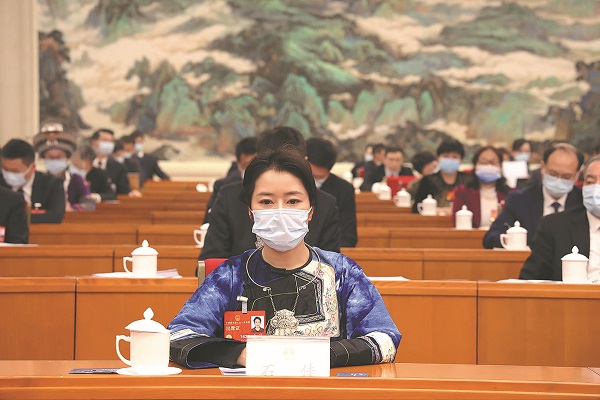Entrepreneur hits big with embroidery

Shi Jia attends the first session of the 14th National People's Congress in Beijing. CHINA DAILY
"Making money for just myself, or making money for myself, my relatives and people in my hometown? That's the obvious difference between the kind of entrepreneurship I did before and the kind I do now."
That was 38-year-old Shi Jia's response when she compared what she did before — running a lucrative engineering company for over a decade — with her current and "much more meaningful" job of helping 1,900 women in her home village prosper by making traditional embroidery that is sold worldwide.
The entrepreneur, who is also a deputy to the 14th National People's Congress, comes from Shilan town, Hunan province. Her life changed in 2017 when she finally decided to quit her company, which was netting an annual revenue of around 25 million yuan ($3.6 million) at the time.
"That was definitely a hard decision," Shi said. "But my attitude changed after the town official and my parents repeatedly pushed me to come home, especially my parents. They were among the earliest pioneers of entrepreneurship in our town, but they persuaded me to give up my company and come home to help the other villagers prosper."
She said that her parents told her, "Don't leave your relatives and friends at home behind when you get rich."
So she started her second company making Miao embroidery, a traditional handicraft of the Miao ethnic group in western Hunan. In Shi's eyes, it had a great potential.
She hired four practitioners of Miao embroidery as instructors, and encouraged left-behind women and female migrant workers to join the company.
All received paid training for three months, after which they were able to choose to work at the company or complete orders at home, which would give them the ability to take care of their farms, elderly relatives and children. Presented with the prospect of a stable job, many migrant workers chose to work at Shi's company.
As business expanded, the company set up five more factories in three counties in western Hunan. Shi also set up product design teams and opened both brick-and-mortar and online stores in a number of cities around the country to promote their work.
Nowadays, embroiderers can earn a stable income ranging from a few thousand to 10,000 yuan a month, and are able to live a life "carrying their babies on their backs, embroidering flowers and supporting themselves and their families".
By 2021, the company employed 1,400 people, was helping 1,272 poor families and permitted 300 migrant worker parents, who had been forced to leave their children to find work, to be employed locally.
In terms of the product design, Shi's team has integrated elements of cultural heritage with fashion and has created 300 lines, including clothing, bags and handicrafts, which are becoming popular with the youth domestically as well as with big international brands.
In 2018, Shi arranged an exhibition of Miao embroidery in Paris. A month later, designers from Hermes created 12 Miao embroidery pieces with Shi's company, which were displayed at the Bordeaux Fashion Show.
"I was unaccustomed to rural life when I returned from the city. I was impetuous, like many urbanites, chasing material things," Shi said. "But I was gradually taken in by country life and began to think that the things I had cared about before weren't that important. Rather, it was the simple life that relaxed me."
Shi stressed that she greatly values the notion of everyone working toward the same goal, just as she and her employees are doing.
- Top legislature schedules standing committee session for late February
- China's top legislator meets with Uruguayan president
- Senior legislator surveys Anhui on formulating outline of provincial 15th Five-Year Plan
- China's top legislator meets with British PM
- NPC deputies see more engagement with top court



